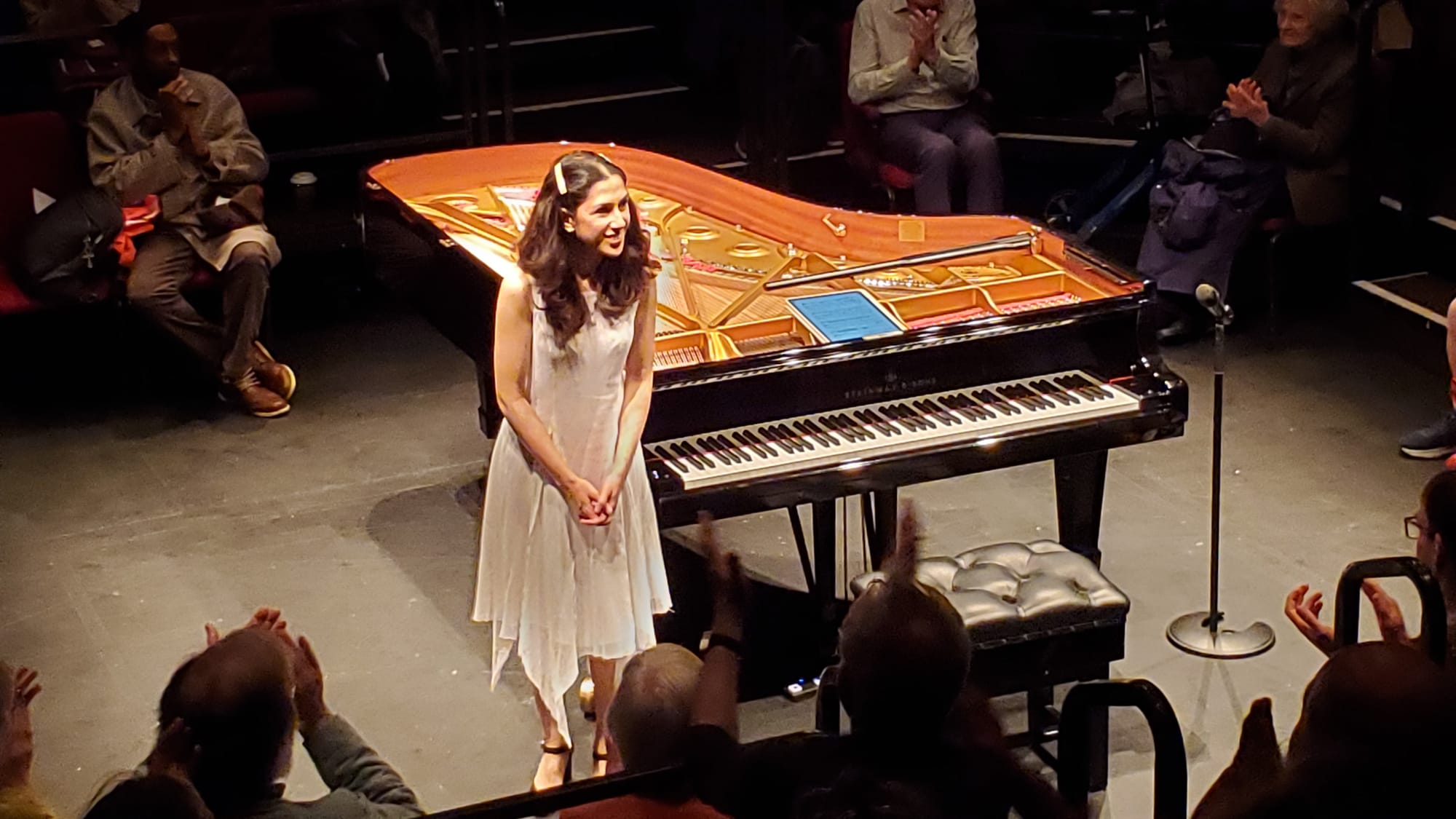
Music In The Round: Romantic Piano Mishka Rushdie Momen (piano). Crucible Playhouse, Sheffield, 11 am, 23.05.2024
Schumann Gesange der Frühe, Op. 133: No. 1 (1853)
Fauré Nocturne No. 13 in B minor, Op. 119 (1921)
Ramean Le Rappel des Oiseaux. Rigaudons I, II & Double. Les tendres Plaintes.
Mendelssohn Variations sérieuses, Op. 54 . MWV U 156 (1841)
Schumann Waldzenen , Op. 82 (1848/9, excerpts)
Ravel Miroirs, M 43 (1907/8, excerpts)
… and so to the final concert from Music in the Round in Sheffield: a delightful brunchtime (11 am) concert by Mishka Rushdie Momen.
Momen’s exquisite recital included music from Rameau to Ravel: her predilection for pre-Baroque music is underlined by her upcoming release on Hyperion, Reformation, which includes works by William Byrd, Orlando Gibbons, John Bull and Jan Pieterszoon Sweelinck (it will be CDA 68445). While Momen’s repertoire focuses on this area and the Romantics, she is evidently also involved with contemporary music: she has commissioned works by Nico Muhly and Héloïse Werner (in the latter case, An Inviting Object for the Lucerne Summer Festival). Her debut solo recording was Variations, on the Somm label, featuring works by the Schumanns as well as works by Brahms, Schumann, Muhly and Iyer, (SOMMCD0603) and she appeared on Steven Isserlis’ recent disc of Solo Cello Music (CDS 68373). Momen also was the pianist in a lecture-recital on Beethoven Cello Sonatas (Opp. 5/1 and 102/1) which lasts one and three quarter hours and can be seen in full below:
Launching her recital with the first of Schumann’s late Gesänge der Frühe (Songs of Dawn) one can hear the same sensitivity and beauty of sound as one encounters on the Somm disc. The first (sadly the only one we heard: this really is a gem of a set) offered a daring start, as it begins with a quiet line, stated plainly in octaves, an invitation to intimacy, drawing the audience in. Creating a sound almost like an organ and delivering chords with spotless cleanliness and with burnished one, this was the finest of starts.
Fauré’s piano music remains under-rated, despite the classic recordings by Germaine Thyssens-Valentin, and more recently, the spectacularly talented Lucas Debargue. The Nocturne No. 13 of 1921. This late piece is filled with angst and regret, the middle section an explosion of anguish. The texture is sometimes sparse, the expression terse, so attempts to over-romanticise it can backfire; that did not quite happen here. Instead, the result was to reveal a piece both complex and heady, It was, though, a call to take late Fauré seriously.
Here, as a “review interlude,” is Thyssens-Valentin in this very piece:
Momen’s interest in earlier keyboard musics came out in a trio of pieces by Rameau: the delightful ‘Rappel des oiseaux’ from the E minor harpsichord suite, itself from the Pièces de clavecin (clean and characterful: Momen reminded me of Hewitt’s Rameau, except Momen played the piece cleaner, and more effectively than Hewitt does in her recording). The pair of Rigaudons that follow (plus ‘Double‘) seemed to relish the act of imitation itself, contrasting that with more robust, dance-like calls to arms. The final piece comes from the Suite in D, ‘Les tendres plaintes,’ was delivered with a haunting sense of right-hand cantabile.
The world of ‘Les tendres plaintes’ is not a million miles away from that of the Mendelssohn theme for his Variations sérieuses, and there was the feeling that Momen was trying to move from the one to the other sans applause. Technically this Mendelssohn was very fine, but interpretatively it was even finer, with Momen completely aware of the importance of inner voices. Occasionally, some staccato passages could have been more ’in’ her fingers, but this was a fine account of one of Mendelssohn’s most famous pieces.
One of Schumann’s pieces that deserves to be one of his best-known pieces (but is not) is Waldszenen. We were gifted four of them here. The first in this sequence (the fourth in Schumann’s) was ‘Einsame Blumen,’ delivered with a lovely touch. The very next piece (in both sequences) is ‘Verrufene Stelle,” a piece with a fragility of texture that hearkened back to the earlier Fauré. ‘Freundliche Landschaft’ is a playful piece, and Momen’s decorations were superbly light. This was nice and fligty, but how carefully Momen had considered the shifting textures. Finally, ‘Vogel als Prophet,’ the most famous of the set (and its seventh in number). The clarity of articulation here was a joy, as was Schumann’s elusive harmonies.
Finally, three pieces from Ravel’s Miroirs: an Impressionist sound painting of sad birds in ‘Oiseaux tristes’ (the high tolling of the opening reminiscent of the bare sonoriies of the recital’s opening, but now even less directional). Again, a nice link, from Schumann’s ‘Vogel’ to Ravel’s ‘Oiseaux’. Perhaps Momen does not quite resonate so deeply with Ravel, though; this felt a little literal. The brighter ‘Alborada del gracioso’ fared better, a feast of virtuosity, before Ravel’s bells (‘La vallée des cloches‘) found Momen once more on the composer’s wavelength – a superb close to a superb recital.
Momen’s Variations disc on SOMM is available on Amazon here; the British Solo Cello Music is here.










